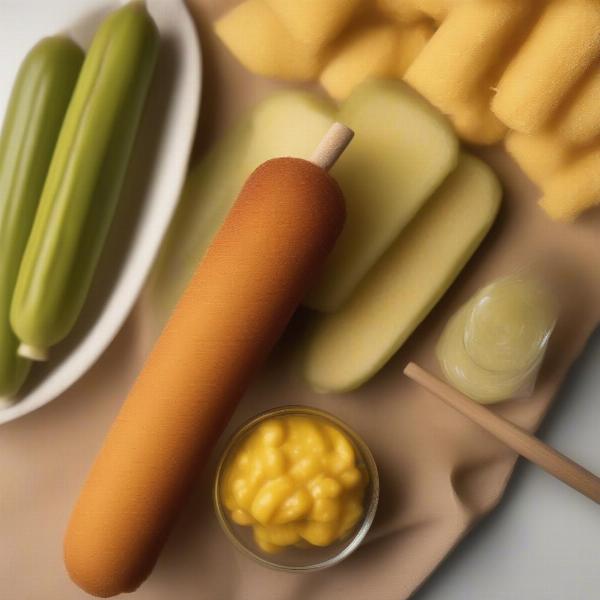Pickle corn dogs have recently gained popularity as a quirky snack for humans. But what about our furry friends? Can dogs eat pickle corn dogs? The short answer is: it’s best to avoid them. While not inherently toxic, the combination of processed meat, fried batter, and pickles presents several potential health risks for dogs. Let’s delve into the reasons why pickle corn dogs aren’t ideal for your canine companion.
A typical pickle corn dog consists of a pickle spear dipped in cornbread batter, deep-fried, and often served on a stick. This combination is high in fat, sodium, and preservatives, none of which are beneficial for dogs. High fat intake can lead to pancreatitis, a serious and potentially life-threatening condition. The high sodium content can cause dehydration and exacerbate existing health problems like heart or kidney disease. Additionally, the preservatives used in processed hot dogs can be harmful to dogs in the long run.
Why Pickle Corn Dogs Aren’t Ideal for Your Dog
While a small bite might not cause immediate harm, regularly feeding your dog pickle corn dogs can lead to various health issues. Let’s break down the components:
- Hot Dogs: While some plain, cooked hot dogs can be given to dogs as an occasional treat, they are generally not recommended due to their high sodium and fat content. Many hot dogs also contain nitrates and nitrites, which can be harmful to dogs.
- Pickles: Pickles are extremely high in sodium, which can be detrimental to a dog’s health. While a small piece of a dill pickle might not cause immediate harm, it’s best to avoid them altogether.
- Cornbread Batter and Frying: The cornbread batter, especially when deep-fried, adds a significant amount of fat and calories to this snack, further increasing the risk of weight gain and pancreatitis in dogs.
 Pickle Corn Dog Ingredients Close Up
Pickle Corn Dog Ingredients Close Up
Healthier Alternatives to Pickle Corn Dogs for Your Pup
Instead of pickle corn dogs, opt for healthier treats specifically designed for dogs. These treats are formulated to meet a dog’s nutritional needs and come in a variety of flavors and textures.
- Dog-Specific Treats: These are readily available at pet stores and come in various forms, from crunchy biscuits to chewy jerky. Choose treats that are appropriate for your dog’s size and age.
- Fresh Fruits and Vegetables: Many fruits and vegetables, like carrots, apples (without the core and seeds), and blueberries, can be healthy and delicious treats for dogs. Always ensure they are cut into bite-sized pieces to prevent choking.
- Homemade Dog Treats: You can also make your own dog treats using simple, dog-friendly ingredients. There are numerous recipes available online that cater to different dietary needs and preferences.
What to Do if Your Dog Eats a Pickle Corn Dog
If your dog accidentally snatches a bite of your pickle corn dog, don’t panic. A small amount is unlikely to cause immediate harm. Monitor your dog for any unusual symptoms like vomiting, diarrhea, or lethargy. If you notice any concerning signs, contact your veterinarian immediately.
Dr. Emily Carter, DVM, advises, “While a small lick of a pickle corn dog probably won’t hurt your dog, it’s best to keep these snacks out of their reach. The high sodium and fat content can be problematic, especially with repeated exposure.”
Conclusion
While pickle corn dogs might be a tempting treat for humans, they’re not suitable for our canine companions. The combination of processed meat, high sodium, and fried batter poses several health risks for dogs. Opt for healthier alternatives like dog-specific treats, fresh fruits and vegetables, or homemade dog treats to keep your furry friend happy and healthy.
FAQ
- Can dogs eat pickles? While a small piece of a dill pickle might not be immediately harmful, it’s best to avoid giving pickles to dogs due to their high sodium content.
- What should I do if my dog eats a whole pickle corn dog? Contact your veterinarian immediately and monitor your dog for any unusual symptoms.
- What are some healthy treat alternatives for my dog? Dog-specific treats, fresh fruits and vegetables (like carrots, apples, and blueberries), and homemade dog treats are all great options.
- Are hot dogs bad for dogs? Hot dogs are high in sodium and fat, and are not recommended as a regular part of a dog’s diet.
- Can high fat intake harm my dog? Yes, high fat intake can lead to pancreatitis, a serious and potentially life-threatening condition in dogs.
- Why is sodium bad for dogs? Excessive sodium can lead to dehydration and exacerbate existing health problems like heart or kidney disease.
- Where can I find healthy dog treat recipes? Numerous online resources and cookbooks offer dog-friendly treat recipes.
ILM Dog is your trusted source for expert advice on all aspects of dog care and well-being. From breed selection and puppy care to senior dog health and training tips, we offer a wealth of practical information to help you provide the best possible care for your canine companion. We specialize in breed selection, health & medical care, training & behaviour, nutrition & feeding, grooming & hygiene, and products & accessories. Contact us today for personalized guidance and support! Email: [email protected]. Phone: +44 20-3965-8624. Visit ILM Dog for more valuable resources and connect with a global community of dog lovers.